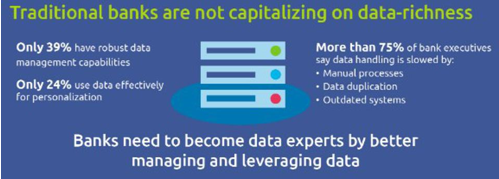
For years now, Machine Learning models and algorithms have been adopted by major financial institutions all over the world and could potentially disrupt the entire financial industry in the near future.
According to a recent survey of the MIT Sloan Management Review, conducted on over 2500 firms worldwide[1], 84% of the surveyed companies stated that AI implementation in their processes, products and services could represent a crucial competitive advantage. At the same time, the World Retail Banking Report by Capgemini and Efma[2] tells us that in 2020 only 39% of banks has started using the huge amount of data in their possession.

Source: Capgemini & EFMA (2020), World Retail Banking Report
Big Data management in banking is, 75% of the time, hampered by manual processes that besides slowing the entire system, may result in fatal errors which compromise models’ reliability and damage information available to decision-makers. To exploit such a huge volume of data, conventional instruments are not sufficient, but companies must use state-of-the-art Machine Learning tools in order to properly process information.
The increasing complexity of financial systems, coupled with the acceleration towards the Digital Transformation that the Covid19 pandemic has inevitably brought along, has led new players in the banking industry to focus on User Experience to expand their market share. In Retail Banking new entrants propose a model centered on the final user, employing tailor-made and customer-friendly services and a business model free of physical branches, thanks to online and mobile banking apps. In this context, industry competition is moving on data and modern financial institution must know how to exploit data at their disposal to develop solutions able to satisfy the needs of the customers, which are more tech-savvy than ever.
Besides improving User Experience, Machine Learning tools can automatize most of the labor-intensive tasks, reducing costs and enhancing productivity and efficiency in every business area. The first step for a bank to approach Artificial Intelligence is to give to AI the right importance, trying to develop a long-term strategy, suitable for every business area. It is no coincidence that “Frontrunners”, the companies which obtained the best results from AI implementation, assign higher priority to AI capabilities and consider them a strategic asset. On the other hand, only 2% of “Starters” (i.e., companies which have just started to get AI solutions or have not yet profited from them) consider AI as a crucial element for future strategy.[3]
Resistance to innovation could irremediably spill over the budget allocated for AI, undermining its ability its ability to be truly effective. In this regard, in order to win the initial skepticism and embrace the AI revolution, it is probably better to start from relatively less ambitious projects, which must be performed under the guidance of senior data scientists and AI experts.
Here some examples of possible applications for AI in the financial services industry:
- Construction of advance credit rating models, which use all available data to produce an accurate evaluation and reduce the default rate;
- Clustering algorithms for customer segmentation, in order to deploy specific measures for every cluster and improve dedicated products and user experience;
- Predictive analytics algorithms to forecast cash flow and corporate fundamentals;
- Pattern identification techniques to detect frauds and illegal operations;
- Natural Language Processing (NPL) algorithms to implement chatbots, virtual assistants and other automation tools;
- Robo-advisors to optimize investment and asset management strategies, satisfy clients’ needs and significantly reduce costs.
According to Gartner, 80% of institutions that offer only traditional services will be out of business before 2030[4].
New players will dominate the market through digital platforms and innovative business models, forcing incumbents to change or check out.
Somebody might find it radical, but widespread diffusion of the data-driven economy is going to make AI tools increasingly more important.
[1] S. Ransbotham, S. Khodabandeh, R. Fehling, B. LaFountain, and D. Kiron (2019) “Winning With AI,”
MIT Sloan Management Review and Boston Consulting Group.
[2] Capgemini & EFMA (2020). “World Retail Banking Report.”
[3] Deloitte (2019). “AI leaders in financial service: Common traits of frontrunners in the
artificial intelligence race.”
[4] Gartner (2018). “Digitalization Will Make Most Heritage Financial Firms Irrelevant.”
Comments are closed.





